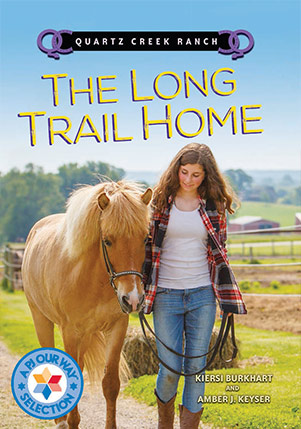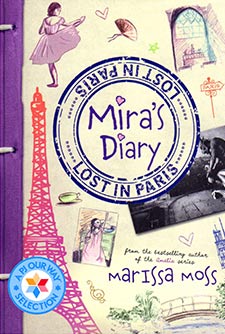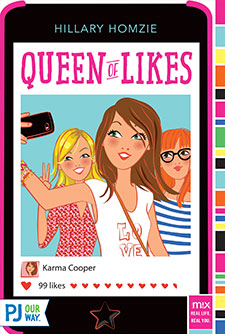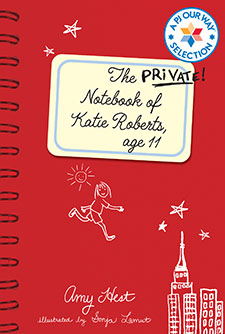The Long Trail Home
When Rivka refuses to have a bat mitzvah, her parents send her away to think long and hard about her feelings. But Rivka loves Quartz Creek Ranch, where she even has her own horse to ride! The real question is, will she ever want to go home again?
Average Rating
( hint: Login to leave a review! )
74 Reviews
Leave Review
What the Book is About
Jewish Content & Values
Positive Role Models
Content Advisory
Talk it Over!
More for You
What the Book is About
Twelve-year-old Rivka is going through a difficult time. Ever since her community synagogue, Havurah Shalom, was defaced with anti-Semitic graffiti, she’s been afraid of identifying as a Jew. Her parents don’t understand why she’s acting out at home and refusing to go through with her upcoming bat mitzvah. They send her to Quartz Creek Ranch for the summer with the hope that she can turn it around. At the ranch, Rivka meets Cat, Sam, and Lauren, each of whom have their own bag of troubles. She learns to ride, and, eventually, finds her own inner strength to deal with the past and look forward to her future.
Jewish Content & Values
- Rivka’s family celebrates Shabbat (the Jewish sabbath) with candle lighting, Kiddush (the blessing over the wine), and a blessing over the challah. She wears a kippah (skullcap; yarmulke in Yiddish) at synagogue and doesn’t keep kosher. Rivka’s brothers attend the same Jewish B’nai B’rith camp where her parents met and married. Rivka plans to celebrate her bat mitzvah at age 13 by reading from the Torah, leading the prayers at synagogue, and doing community service.
- When a baby foal is born, Rivka is inspired to sing the Shehecheyanu blessing, which is traditionally recited as a prayer of thankfulness on a “first” occasion.
- Rivka is exposed to anti-Semitism; at her synagogue, glass is broken and a red swastika and “white power” and “KKK” are sprayed in paint on the front door.
Positive Role Models
- Ma Etty runs the Quartz Creek Ranch with a mixture of firmness, humor, and love, and tries to instill the troubled teens with self-confidence and good values through hard work and riding.
- Rivka matures during her time at Quartz Creek Ranch and finds the strength to communicate with her parents about how she feels about being Jewish.
Content Advisory
Although it’s not described in a scary way, kids might be concerned by the idea of a defaced synagogue. Other points to mention: there is a very detailed anatomical description of a baby foal’s birth, and at a campfire, someone tells a ghost story during which all the characters eventually die in various (non-violent) unlucky ways. Some families may be offended at Rivka’s joining a group at church to sort clothes for charity.
Talk it Over!
When Rivka becomes impatient and angry while riding, her horse, Rowdy, refuses to respond to her commands. Have you ever gotten something done by remaining calm that you couldn’t do while frustrated? Do you think that a calm and patient attitude will only bring results with animals, or does it work with people, too?
More for You
The Shehecheyanu is a joyous blessing of thankfulness to God traditionally recited when experiencing something for the first time that year, such as celebrating a Jewish festival, eating a seasonal fruit, or wearing new clothes. You can even recite the blessing when greeting an old friend that you haven’t seen in a while.
Baruch atah Adonai, Eloheinu Melech haolam, shehecheyanu, v'kiy'manu, v'higianu laz'man hazeh.
Blessed are You, God, Sovereign of all, for giving us life, sustaining us, and enabling us to reach this occasion.
Baruch atah Adonai, Eloheinu Melech haolam, shehecheyanu, v'kiy'manu, v'higianu laz'man hazeh.
Blessed are You, God, Sovereign of all, for giving us life, sustaining us, and enabling us to reach this occasion.
What the Book is About
What the Book is About
Twelve-year-old Rivka is going through a difficult time. Ever since her community synagogue, Havurah Shalom, was defaced with anti-Semitic graffiti, she’s been afraid of identifying as a Jew. Her parents don’t understand why she’s acting out at home and refusing to go through with her upcoming bat mitzvah. They send her to Quartz Creek Ranch for the summer with the hope that she can turn it around. At the ranch, Rivka meets Cat, Sam, and Lauren, each of whom have their own bag of troubles. She learns to ride, and, eventually, finds her own inner strength to deal with the past and look forward to her future.
Jewish Content & Values
Jewish Content & Values
- Rivka’s family celebrates Shabbat (the Jewish sabbath) with candle lighting, Kiddush (the blessing over the wine), and a blessing over the challah. She wears a kippah (skullcap; yarmulke in Yiddish) at synagogue and doesn’t keep kosher. Rivka’s brothers attend the same Jewish B’nai B’rith camp where her parents met and married. Rivka plans to celebrate her bat mitzvah at age 13 by reading from the Torah, leading the prayers at synagogue, and doing community service.
- When a baby foal is born, Rivka is inspired to sing the Shehecheyanu blessing, which is traditionally recited as a prayer of thankfulness on a “first” occasion.
- Rivka is exposed to anti-Semitism; at her synagogue, glass is broken and a red swastika and “white power” and “KKK” are sprayed in paint on the front door.
Positive Role Models
Positive Role Models
- Ma Etty runs the Quartz Creek Ranch with a mixture of firmness, humor, and love, and tries to instill the troubled teens with self-confidence and good values through hard work and riding.
- Rivka matures during her time at Quartz Creek Ranch and finds the strength to communicate with her parents about how she feels about being Jewish.
Content Advisory
Content Advisory
Although it’s not described in a scary way, kids might be concerned by the idea of a defaced synagogue. Other points to mention: there is a very detailed anatomical description of a baby foal’s birth, and at a campfire, someone tells a ghost story during which all the characters eventually die in various (non-violent) unlucky ways. Some families may be offended at Rivka’s joining a group at church to sort clothes for charity.
Talk it Over!
Talk it Over!
When Rivka becomes impatient and angry while riding, her horse, Rowdy, refuses to respond to her commands. Have you ever gotten something done by remaining calm that you couldn’t do while frustrated? Do you think that a calm and patient attitude will only bring results with animals, or does it work with people, too?
More for You
More for You
The Shehecheyanu is a joyous blessing of thankfulness to God traditionally recited when experiencing something for the first time that year, such as celebrating a Jewish festival, eating a seasonal fruit, or wearing new clothes. You can even recite the blessing when greeting an old friend that you haven’t seen in a while.
Baruch atah Adonai, Eloheinu Melech haolam, shehecheyanu, v'kiy'manu, v'higianu laz'man hazeh.
Blessed are You, God, Sovereign of all, for giving us life, sustaining us, and enabling us to reach this occasion.
Baruch atah Adonai, Eloheinu Melech haolam, shehecheyanu, v'kiy'manu, v'higianu laz'man hazeh.
Blessed are You, God, Sovereign of all, for giving us life, sustaining us, and enabling us to reach this occasion.





